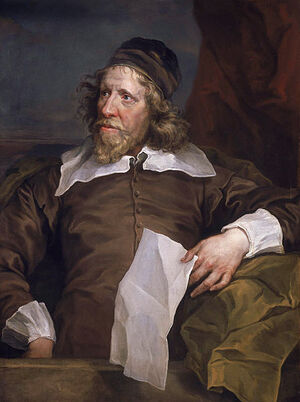Inigo Jones (nonfiction): Difference between revisions
(Created page with "thumb|Inigo Jones (/ˈɪnᵻɡoʊ/; 15 July 1573 – 21 June 1652) was the first significant English architect (of Welsh ancestry) in the early modern...") |
No edit summary |
||
| Line 1: | Line 1: | ||
[[File:Inigo_Jones.jpg|thumb|]]Inigo Jones (/ˈɪnᵻɡoʊ/; 15 July 1573 – 21 June 1652) was the first significant English architect (of Welsh ancestry) in the early modern period, and the first to employ [[Vitruvius (nonfiction)|Vitruvian]] rules of proportion and symmetry in his buildings. | [[File:Inigo_Jones.jpg|thumb|]]'''Inigo Jones''' (/ˈɪnᵻɡoʊ/; 15 July 1573 – 21 June 1652) was the first significant English architect (of Welsh ancestry) in the early modern period, and the first to employ [[Vitruvius (nonfiction)|Vitruvian]] rules of proportion and symmetry in his buildings. | ||
As the most notable architect in England, Jones was the first person to introduce the classical architecture of Rome and the Italian Renaissance to Britain. | As the most notable architect in England, Jones was the first person to introduce the classical architecture of Rome and the Italian Renaissance to Britain. | ||
Latest revision as of 17:16, 12 June 2017
Inigo Jones (/ˈɪnᵻɡoʊ/; 15 July 1573 – 21 June 1652) was the first significant English architect (of Welsh ancestry) in the early modern period, and the first to employ Vitruvian rules of proportion and symmetry in his buildings.
As the most notable architect in England, Jones was the first person to introduce the classical architecture of Rome and the Italian Renaissance to Britain.
He left his mark on London by his design of single buildings, such as the Queen's House which is the first building in England designed in a pure classical style, and the Banqueting House, Whitehall, as well as the layout for Covent Garden square which became a model for future developments in the West End.
He made major contributions to stage design by his work as theatrical designer for several dozen masques, most by royal command and many in collaboration with Ben Jonson.
In the News
Fiction cross-reference
Nonfiction cross-reference
External links:
- Inigo Jones @ Wikipedia
Attribution:
